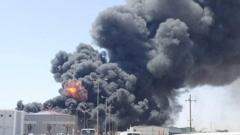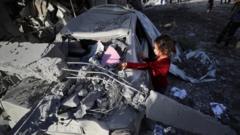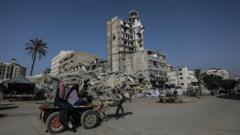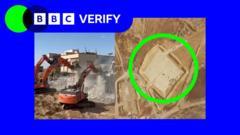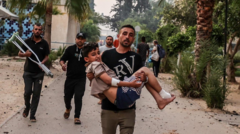In a complex and controversial move, Israel is reportedly setting up new sites in Gaza intended to serve as distribution centers for humanitarian aid. These developments come after Israel suspended food and medicine deliveries to the region back in March amidst rising tensions and accusations against Hamas for misappropriating aid—a claim the group vehemently denies.
**Gaza Aid Distribution Sites Under Construction Amid Controversy Over Israeli-US Plan**
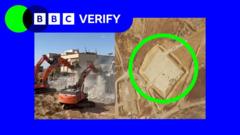
**Gaza Aid Distribution Sites Under Construction Amid Controversy Over Israeli-US Plan**
Satellite images reveal construction developments for humanitarian aid distribution hubs in Gaza, despite international criticism of the Israeli government's handling of aid.
According to recent satellite images analyzed by BBC Verify, clearing operations have been conducted to establish new roads and staging areas primarily in southern and central Gaza. Although the specifics about the exact locations of these distribution hubs have not been publicly disclosed, knowledgeable sources indicate that they will comprise at least four centers in the south and one in the northern region close to the Netzarim Corridor, a militarized area under Israeli control.
The Gaza Humanitarian Foundation—which is involved in the aid distribution initiative—has announced intentions to supply essential items like food, water, and hygiene kits to approximately 1.2 million people, which unfortunately represents less than 60% of the overall population in Gaza. However, calls have arisen for Israel to facilitate normal channels for aid deliveries until these new centers are fully operational, sparking further concern over the implications of shifting aid logistics.
UN agencies have condemned the plan, stating their unwillingness to cooperate, arguing that it violates fundamental humanitarian principles. A spokesperson for the UN Office for the Coordination of Humanitarian Affairs (OCHA) stated that the potential approach poses a danger of neglecting vast portions of the population, particularly vulnerable groups unable to relocate.
In parallel, humanitarian advocates like Oxfam have criticized the Israeli plan as a "farce," emphasizing the urgent need to lift the blockade and allow for unrestricted aid access rather than creating potentially militarized hubs.
The newly constructed sites, which bear similarities to existing distribution locations like Erez and Kerem Shalom, will reportedly be fortified and controlled by Israeli forces. However, the Israeli government has yet to finalize approvals for these initiatives, leaving numerous questions about their efficacy and the humanitarian situation on the ground.
As the situation develops, the United Nations continues to stress that the basic needs of Gaza’s population must be met, holding the responsibility under international law, while Israel maintains compliance with legal norms amid the mounting casualty figures and humanitarian crises unfolding in the region.
The Gaza Humanitarian Foundation—which is involved in the aid distribution initiative—has announced intentions to supply essential items like food, water, and hygiene kits to approximately 1.2 million people, which unfortunately represents less than 60% of the overall population in Gaza. However, calls have arisen for Israel to facilitate normal channels for aid deliveries until these new centers are fully operational, sparking further concern over the implications of shifting aid logistics.
UN agencies have condemned the plan, stating their unwillingness to cooperate, arguing that it violates fundamental humanitarian principles. A spokesperson for the UN Office for the Coordination of Humanitarian Affairs (OCHA) stated that the potential approach poses a danger of neglecting vast portions of the population, particularly vulnerable groups unable to relocate.
In parallel, humanitarian advocates like Oxfam have criticized the Israeli plan as a "farce," emphasizing the urgent need to lift the blockade and allow for unrestricted aid access rather than creating potentially militarized hubs.
The newly constructed sites, which bear similarities to existing distribution locations like Erez and Kerem Shalom, will reportedly be fortified and controlled by Israeli forces. However, the Israeli government has yet to finalize approvals for these initiatives, leaving numerous questions about their efficacy and the humanitarian situation on the ground.
As the situation develops, the United Nations continues to stress that the basic needs of Gaza’s population must be met, holding the responsibility under international law, while Israel maintains compliance with legal norms amid the mounting casualty figures and humanitarian crises unfolding in the region.








